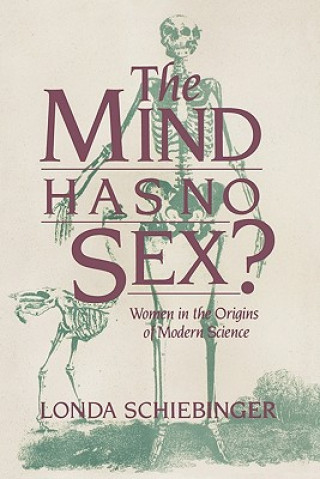
Kód: 02704907
Mind Has No Sex?
Autor Londa Schiebinger
As part of his attempt to secure a place for women in scientific culture, the Cartesian Francois Poullain de la Barre asserted as long ago as 1673 that the mind has no sex? In this rich and comprehensive history of women's contrib ... celý popis
- Jazyk:
 Angličtina
Angličtina - Väzba: Brožovaná
- Počet strán: 368
Nakladateľ: Harvard University Press, 1991
- Viac informácií o knihe

Mohlo by sa vám tiež páčiť
-

Behavior of Chemical Elements in Stars
196.85 € -

Cambridge Companion to the French Novel
117.59 € -

Transatlantic Sketches
66.46 € -

Prague Travel Guide
13.28 € -

Jujitsu
24.02 € -

Belief and Organization
139.37 € -

Minerva Mint Pack B of 3
28.42 €
Darujte túto knihu ešte dnes
- Objednajte knihu a vyberte Zaslať ako darček.
- Obratom obdržíte darovací poukaz na knihu, ktorý môžete ihneď odovzdať obdarovanému.
- Knihu zašleme na adresu obdarovaného, o nič sa nestaráte.
Viac informácií o knihe Mind Has No Sex?
Nákupom získate 181 bodov
 Anotácia knihy
Anotácia knihy
As part of his attempt to secure a place for women in scientific culture, the Cartesian Francois Poullain de la Barre asserted as long ago as 1673 that the mind has no sex? In this rich and comprehensive history of women's contributions to the development of early modem science, Londa Schiebinger examines the shifting fortunes of male and female equality in the sphere of the intellect. Schiebinger counters the great women mode of history and calls attention to broader developments in scientific culture that have been obscured by time and changing circumstance. She also elucidates a larger issue: how gender structures knowledge and power. It is often assumed that women were automatically excluded from participation in the scientific revolution of early modem Europe, but in fact powerful trends encouraged their involvement. Aristocratic women participated in the learned discourse of the Renaissance court and dominated the informal salons that proliferated in seventeenth-century Paris. In Germany, women of the artisan class pursued research in fields such as astronomy and entomology. These and other women fought to renegotiate gender boundaries within the newly established scientific academies in order to secure their place among the men of science. But for women the promises of the Enlightenment were not to be fulfilled. Scientific and social upheavals not only left women on the sidelines but also brought about what the author calls the scientific revolution in views of sexual difference? While many aspects of the scientific revolution are well understood, what has not generally been recognized is that revolution came also from another quarter--the scientific understanding of biological sex and sexual temperament (what we today call gender). Illustrations of female skeletons of the ideal woman--with small skulls and large pelvises--portrayed female nature as a virtue in the private realm of hearth and home, but as a handicap in the world of science. At the same time, seventeenth- and eighteenth-century women witnessed the erosion of their own spheres of influence. Midwifery and medical cookery were gradually subsumed into the newly profess ionalized medical sciences. Scientia, the ancient female personification of science, lost ground to a newer image of the male researcher, efficient and solitary--a development that reflected a deeper intellectual shift. By the late eighteenth century, a self-reinforcing system had emerged that rendered invisible the inequalities women suffered. In reexamining the origins of modem science, Schiebinger unearths a forgotten heritage of women scientists and probes the cultural and historical forces that continue to shape the course of scientific scholarship and knowledge.
 Parametre knihy
Parametre knihy
Zaradenie knihy Knihy po anglicky Society & social sciences Society & culture: general Social groups
73.11 €
- Celý názov: Mind Has No Sex?
- Autor: Londa Schiebinger
- Jazyk:
 Angličtina
Angličtina - Väzba: Brožovaná
- Počet strán: 368
- EAN: 9780674576254
- ISBN: 067457625X
- ID: 02704907
- Nakladateľ: Harvard University Press
- Hmotnosť: 552 g
- Rozmery: 158 × 234 × 20 mm
- Dátum vydania: 01. March 1991
Obľúbené z iného súdka
-

Women Who Run with the Wolves
11.95 € -

Freedom Writers Diary
15.33 € -9 % -

Think Like a Monk
15.74 € -24 % -

Orientalism
11.03 € -23 % -

How Europe Underdeveloped Africa
22.90 € -18 % -

Desert Flower
10.22 € -24 % -

Why Does He Do That?
16.45 € -15 % -

Letters to a Young Muslim
12.26 € -23 % -
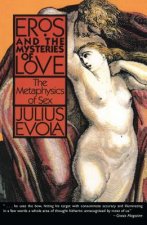
Eros and Mysteries of Love
17.17 € -18 % -

Life After Darkness
21.67 € -20 % -

Puer Tea
44.47 € -

Womanhood
25.96 € -17 % -

JFK - 9/11
33.53 € -

Complete Book of Pilates for Men
19.32 € -20 % -

Gypsy Identities 1500-2000
69.02 € -

Servitors of Empire
20.34 € -3 % -

Colloquial Yiddish
67.99 € -

Sword of No-sword
27.60 € -5 % -
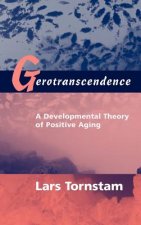
Gerotranscendence
145.61 € -

Northwest Coast Indian Art
29.85 € -4 % -

Qur'an
32.82 € -23 % -

When God Was A Woman
19.62 € -4 % -

The Mastery of Love
12.36 € -19 % -

Vintage Menswear
18.50 € -

Who Cooked the Last Supper?
19.83 € -7 % -

Women Who Run With The Wolves
17.58 € -9 % -

The Way of Men
14 € -19 % -

The Autobiography of Malcolm X
10.52 € -8 % -

Second Sex
16.56 € -23 % -

Goddesses in Everywoman
12.26 € -23 % -

Talking with Female Serial Killers - A chilling study of the most evil women in the world
11.14 € -23 % -

Intellectuals and Society
22.39 € -21 % -

Women in the Qur'an
20.95 € -2 % -

Erotic Bondage Book
14.82 € -18 % -
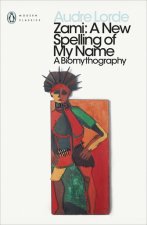
Zami
10.11 € -22 % -

Nine Years among the Indians, 1870-1879
30.16 € -

Dark Emu
16.56 € -23 % -

Childhood and Society
16.35 € -19 % -

Happy City
12.26 € -23 % -
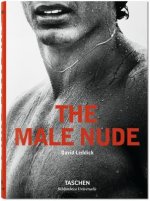
The Male Nude
18.30 € -10 % -

The Bell Curve
18.70 € -23 % -

We Should All Be Feminists
7.56 € -25 % -

Empire of the Summer Moon
14.41 € -23 % -

Radium Girls
11.14 € -23 % -

Dance of Anger
11.14 € -23 % -

Beauty Myth
14.41 € -23 % -

Muqaddimah
21.67 € -17 % -

TROUBLEMAKER
15.64 € -18 % -
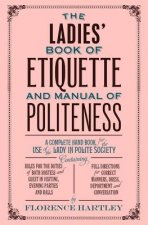
Ladies' Book of Etiquette and Manual of Politeness
13.18 € -19 %
Osobný odber Bratislava a 2642 dalších
Copyright ©2008-24 najlacnejsie-knihy.sk Všetky práva vyhradenéSúkromieCookies



 21 miliónov titulov
21 miliónov titulov Vrátenie do mesiaca
Vrátenie do mesiaca 02/210 210 99 (8-15.30h)
02/210 210 99 (8-15.30h)